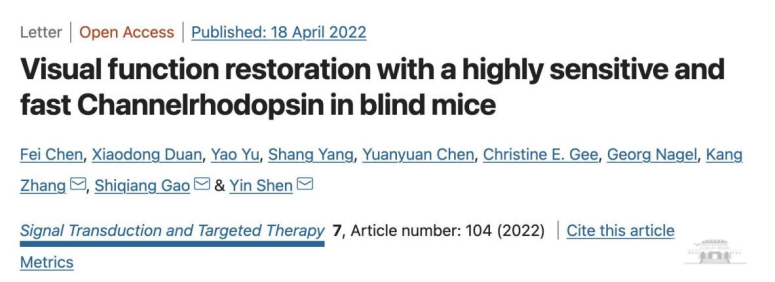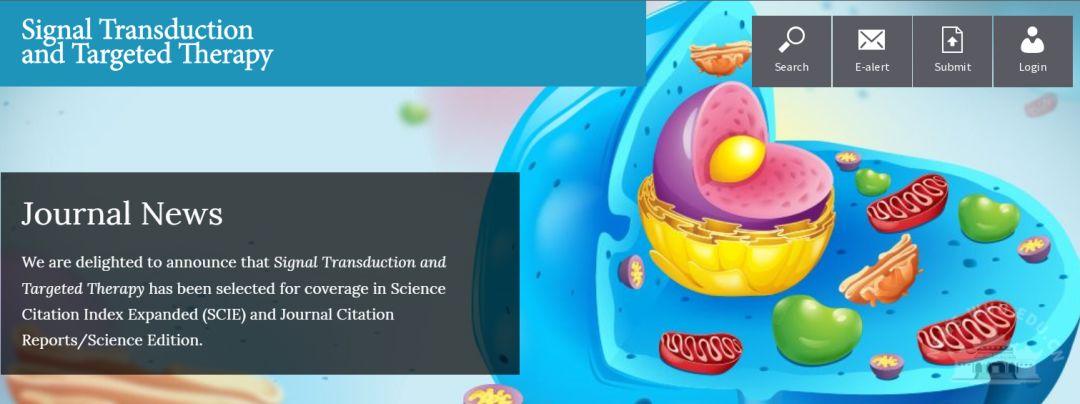On April 18th, Signal Transduction and Targeted Therapy (IF = 18.187), a subjournal of Nature, published online a paper entitled Visual function restoration with a highly sensitive and fast Channelrhodopsin in blind mice, by ophthalmology professor Yin Shen from Renmin Hospital of Wuhan University who is the corresponding author.
The animal experiments of this study demonstrated that the use of the new photosensitive protein could increase vision in blind mice to around 0.3 of human vision. This also means that patients with blinding retinopathy, once regarded as incurable, now have possibilities for regaining vision.

Screenshot of the paper
This innovative research is the first to reveal the effectiveness of a novel photosensitive protein in treating retinal degenerative disease when activated by lights below the safe threshold of the retina, providing methods for optogenetics combined with other technical means to treat retinal degenerative disease, thus presenting another important breakthrough in the field of global retinal neurodegenerative disease research. STTT of Nature Publishing Group is a globally significant journal in the field of signal transduction and targeted therapy and also a region I journal in the medical field.

According to subject leader, Professor Shen Yin, retinitis pigmentosa is a kind of chronic blinding disease with a clinical incidence of 1/4000, which can eventually lead to blindness and badly influence the life quality of patients. Under the guidance of Prof. Shen and with the help of German collaborators, PhD students Fei Chen and Yao Yu screened a modified version of the microbial photosensitive protein with high sensitivity and fast microorganism rhodopsin and restored the visual function of blind mice using optogenetic techniques.

Blind mice with visual function after introducing rhodopsin
The newly published paper reveals for the first time that the use of a novel photosensitized protein can improve the visual acuity of blind mice to around 0.3 of human visual acuity at a safe light intensity threshold with a fast response to light and a temporal resolution of at least 32 Hz. This result provides a basis for the clinical use of optogenetics in the treatment of degenerative rentinopathy, and also offers the possibility of combining optogenetics with other techniques for treating degenerative retinopathy.

Professor Shen Yin
According to Prof. Shen, there are 20 million blind people around the world, and there is no effective therapy for retinitis pigmentosa and other retinal genetic diseases in clinical practice. These diseases can eventually lead to blindness in patients and badly influence their life quality. Once the new rhodopsin is applied in clinical practice, all kinds of hereditary retinopathy caused by photoreceptor apoptosis or degenerative retinopathy can become curable. Moreover, patients with age-related macular degeneration which has a morbidity rate of 13% can benefit from the treatment before advanced complete retinal atrophy occurs.
Professor Shen Yin’s team has been deeply involved in the translation of research and clinical treatment of hereditary eye diseases for more than a decade, carrying out new technologies and practices in the diagnosis and treatment of genetic eye diseases and operating a specialized center for hereditary eye diseases. Shen and her team’s scientific and technological innovations around hereditary eye diseases have been published in prestigious journals such as Science Advance、PNAS、Nature Structure & Molecular Biology、elife. The application of new highly sensitive fast channelrhodopsin in clinical practice based on this research will benefit a large number of patients suffering from hereditary eye diseases.
In December 2021, Academician Yang Xiongli, who has long been engaged in the study of the neural mechanisms of vision, established an academician workstation at the Renmin Hospital of Wuhan University. Prof. Shen Yin, as an outstanding student guided by Academician Yang, leads the integration of ophthalmology, neurology and psychiatry related departments of Renmin Hospital, and the Academician Workstation of Yang Xiongli as well. The team of the workstation focuses on the basic research and translation of neurological diseases related to ophthalmology and neuropsychiatry and set up a Neuro-Ophthalmology MDT and Genetic Ophthalmology Specialized Clinic, and has published important scientific and technological innovations on the pathogenesis of Alzheimer's disease in the main journal of Nature and other series of journals.
Rewritten by Wen Puwen
Edited by Zhang Ruoxi, Sylvia, Xibingqing